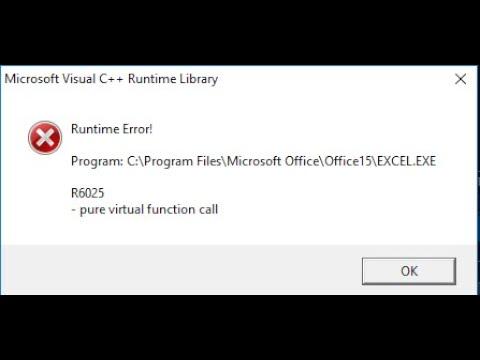It all started one quiet afternoon as I was immersed in debugging a complex piece of software I’d been working on for weeks. The application was nearing its final stages, and I was on the verge of deploying it when an unexpected error message flashed on my screen: “Runtime Error R6025 – Pure Virtual Function Call.” My heart sank. I had seen error codes before, but this one seemed particularly elusive and frustrating.
I’d been coding for years, and despite my experience, this issue felt like a brick wall I couldn’t scale. The application was designed to manage complex data interactions, and I had painstakingly ensured that every function was implemented correctly. The error was popping up at runtime, and it seemed to be associated with a specific sequence of actions, which only complicated the debugging process further.
The error message, “Pure Virtual Function Call,” suggested that a pure virtual function, which is a function declared in a base class and expected to be overridden by derived classes, was being called in a context where it hadn’t been properly overridden. In other words, somewhere in my code, a function was being called that should have been implemented by a derived class but wasn’t. This was a critical issue because pure virtual functions are abstract by nature and cannot be instantiated.
To tackle this, I first revisited my codebase, focusing on the classes involved. I began by reviewing the base classes where the pure virtual functions were declared. I meticulously checked if all derived classes had indeed implemented these functions. I combed through each derived class and verified that no function was left unimplemented. It was crucial to ensure that every virtual function had a concrete implementation before it was invoked.
During this process, I stumbled upon a crucial oversight. One of my derived classes had a function that was intended to override a base class function but inadvertently missed the override keyword. This small oversight meant that the function was not properly linked to its base class counterpart, causing the runtime error when it was called.
To fix this, I corrected the function definition in the derived class by explicitly using the override keyword. This would not only ensure that the function was correctly overriding the base class function but also improve code clarity and reduce the risk of similar issues in the future. After making these changes, I recompiled the application and tested the same sequence of actions that previously triggered the error.
Despite this fix, the error persisted, suggesting there were more layers to this problem. I continued my investigation and looked at the instantiation of the derived classes. I verified that no base class pointers or references were being used to invoke methods that should only be called on fully instantiated derived objects. It was crucial to ensure that the base class pointers or references were not mistakenly invoking pure virtual functions.
In my deeper exploration, I realized there was a case where a base class pointer was used to invoke a function. The pointer, however, was assigned to a derived class object but was used before the derived class was fully constructed. This timing issue caused the base class function to be called on an incomplete object, leading to the runtime error.
To address this, I modified the object construction and initialization sequence. I ensured that all derived class objects were fully constructed before any of their functions were called. Additionally, I used smart pointers to manage the lifetime of objects more effectively and prevent premature calls to functions that might be undefined due to incomplete object construction.
After making these adjustments, I ran a thorough set of tests. I included edge cases and stress tests to ensure that the application was robust and free from the runtime error. Gradually, the error messages disappeared, and the application began to run smoothly.
This experience underscored the importance of careful design and implementation in object-oriented programming. Handling pure virtual functions and ensuring that they are correctly overridden and invoked is crucial for maintaining a stable and reliable application. It also highlighted the value of thorough testing and the need to address both coding errors and timing issues in the object lifecycle.
Ultimately, resolving the Runtime Error R6025 required a combination of meticulous code review, proper implementation of overrides, and careful management of object lifetimes. By delving into these aspects, I was able to fix the issue and ensure that the application functioned as intended. The journey was a reminder of the challenges and intricacies involved in software development but also a testament to the satisfaction of overcoming such obstacles.
